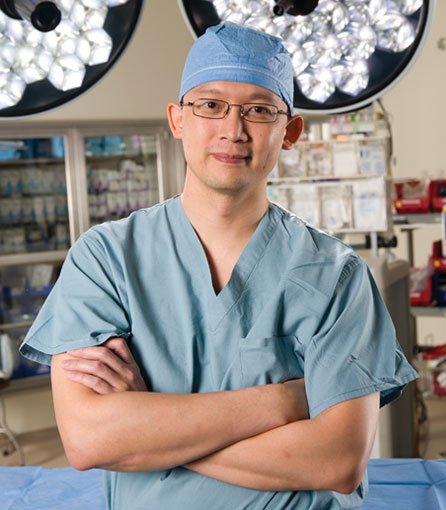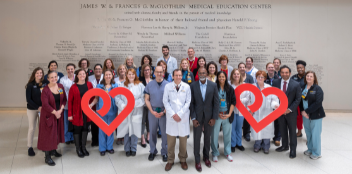VCU Honored for 100th TAH Implant
John Duval recalls the day in April 2006 when Vigneshwar Kasirajan, M.D., now chair of Surgery, led the first surgical team on the East Coast to implant a total artificial heart.
 Daniel Tang, M.D.
Daniel Tang, M.D.
The surgery was successful, but the day was filled with “the excitement but also the tension of doing the first case of its type,” says Duval, the recently retired CEO of VCU Hospitals and Clinics. He remembers Sherry Lockhart, Cardiac Surgery ICU nurse manager, leaning against the wall after the exhausting day. “I related to her, ‘There will come a time when these cases will be routine.’”
That time is now at VCU Pauley Heart Center, which in September 2016 implanted its 100th SynCardia CardioWest total artificial heart. Daniel Tang, M.D., director of Heart Transplantation, Heart-Lung Transplantation and Mechanical Circulatory Support, led the surgical team.
“VCU is the third busiest program in the country,” says nurse practitioner Laura Kreisa, program manager, Heart Failure and Transplant. Much has changed for patients over the years. “In 2010, we did 21 total artificial hearts and at that time, people were not leaving the hospital” until they received their transplant.
Then, total artificial heart patients were hooked up to “Big Blue,” a 400-pound air console that kept their hearts pumping. Beginning in March 2011, with the use of the more portable Freedom Driver at VCU, many patients could go home until their transplant heart became available. Kasirajan was the lead investigator of the national clinical trial for the 14-pound driver.
Heart failure cardiologist and researcher Richard Cooke, M.D., describes the advent of the artificial heart as one of the highlights of his career at VCU. “This has permitted us to help a group of patients who otherwise would have perished without this technology,” he says.
Currently, a patient may have to wait six months to two years for a transplant heart. The mechanical heart provides a “bridge to transplant”—an opportunity to sustain and improve the patients’ health as they wait for a transplant.
VCU is also conducting a clinical trial exploring the artificial heart as “destination therapy,” that is, as a permanent solution, says Tang. “This is important as this can be the only option for patients who are not a candidate for an LVAD (Left Ventricular Assist Device) or transplant.”
LVADs, which can be a destination therapy, “are mechanical pumps that can assist the heart and augment blood flow to the left ventricle,” says Keyur Shah, M.D., medical director of the Mechanical Circulatory Support Program. Although they have the potential for complications, “the devices are remarkable in that they last years and years and they improve quality of life and they improve duration of life.”
“This has permitted us to help a group of patients who otherwise would have perished without this technology,” says Cooke.
VCU was involved in early trials for the LVAD, first implanting one in 1994. Then, Shah, Cooke and Tang were all recruited to VCU in the 2008-2010 period, which “was sort of the birth of the LVAD era,” says Shah. Since then, the program has continued to grow, and now has six heart failure cardiologists and four cardio-thoracic surgeons. The unit implants an average of 50 LVADs and artificial hearts each year.
Whatever the therapy chosen, the patient’s surgical and post-operative team play a critical role in recovery. After surgery, the patient is transported to the Cardiac ICU and then to Main 10 West/Central, the step-down floor for transplant, mechanical assist device, and heart failure patients. Follow-up care is provided at the hospital’s specialized clinic for patients with assist devices.
In 2015, the Cardiac Surgery ICU received the Gold Beacon Award for Excellence, the highest award given by the American Association of Critical-Care Nurses, while last year Main 10 West/Central and the Cardiac ICU were each honored with a Silver Beacon Award.
“The heart failure team is such a well-honed, skilled group,” says Duval. “And they’re just such a humane group of professionals and care for these extraordinarily ill patients with a kindness and a compassion that just makes you really proud to be part of VCU.”
Back to Winter-2017
Join our Pauley Consortium composed of patients, friends and advocates.

